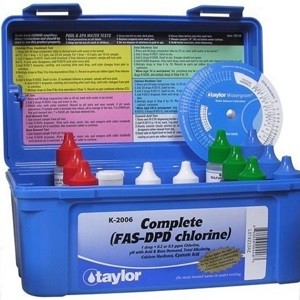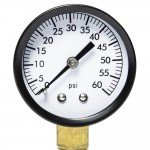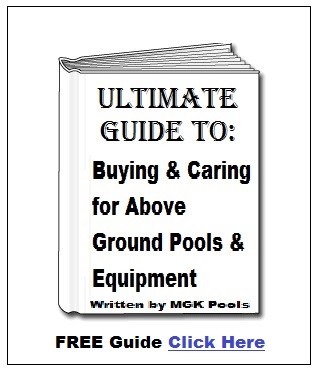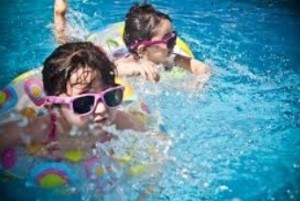Pool Maintenance Basics & So Much More
I can perform weekly pool maintenance tasks for most customers with a quick 20-minute visit once a week. I tell you this, so you know, pool maintenance is pretty simple and does not need to be very time-consuming. The purpose of this Pool Maintenance Guide is to teach you what you need to do. Then to act as a reference going forward for other routine pool upkeep concerns.
I (Michael G Kern) am a certified pool operator (CPO), as such have met the necessary training requirements, and passed the required tests to obtain this certification. With 30 plus years of experience, I know what it takes to maintain pool water in a health and safety kind of way. This pool maintenance 101 information comes from my personal experience and education, over a long career.
Pool Maintenance 101 Overview
The pool filter is mostly responsible for keeping the water clear. Chemicals are used to keep the water sanitized and algae free. If the chemical you use to kill germs (like chlorine) get used up, then algae will grow and germs won’t die. See Cleaning A Green Pool Fast Article
With a clean pool filter, an available chemical sanitizer like chlorine in the water, and by regularly adding a little algaecide in your pool, you will easily maintain a crystal clear and clean swimming pool.
Pool Maintenance Tips /Advice
- Buy a really big cartridge filter. Bigger the better unless you like cleaning pool filters.
- Run your pool 24 hours a day, circulate it just fast enough to filter all the water once in 24 hrs. This is why you must have a two-speed pump or variable-speed pool pump.
- Keep sanitizer present in water at all times. I prefer to run an ozone generator and supplement with hydrogen peroxide with an Oxygen Pools System. Oxygen Pools is an alternative to Chlorine (Chlorine Free).
Welcome New Pool Owners – And New Members of the MGK Pool Family
My purpose for writing this pool maintenance guide is to assist all those who have bought a swimming pool from me. You may feel a bit lost with the upkeep aspect of owning a swimming pool. Now that I am selling so many swimming pools, I felt obligated to provide this guide.
Pool Maintenace – Crystal Clear Safe Sparkling Bathing Water
I use the term bathing water instead of swimming pool water for a reason. While you are never going to bring out the soap and shampoo, you are sharing bathwater.
This thought is gross enough, but add to it the knowledge that everyone involuntarily urinates .15 to .33 ounces when entering a pool. Some will relieve themselves voluntarily. Then there is the percentage of fecal (poop) being brought in by people (kids don’t clean up as well). You quickly see the need for diligent pool maintenance routines as well as frequent bathroom breaks for the young ones.
I promise no more gross stuff, but I hope I have your attention. Pool maintenance is essential and requires a responsible pool operator no matter the pool type or size. The smaller the body of water the more critical sanitation is.
You need to maintain balanced pool water chemistry with proper levels of sanitizer, keep your pool filter functioning well to remove dirt and contaminants and remove debris not caught by the pools circulation system via skimming and vacuuming. There are many ways to do each of these jobs, and lots of equipment to make the job easier.
Pool Chemistry – Water Balance Using Chlorine
If you have not replaced your water in the past ten years, the chances are good that you should now. Have your pool water tested for TDS (total dissolved solids)? Any level higher than four times your tap water and you should be thinking about replacing most of your water. With a high level of TDS, your water will look dull, and it will be hard to maintain the chlorine level.
Let us make sure we start out by filling the pool with good water in the first place. You have three choices usually when filling your pool; Well-water, Trucked in water, and Town/tap water. You should have your house water tested anyway to get a baseline of the chemical levels in your replacement/makeup-water and to see what you will need if filling for the first time with house water.
If using a well or even with town water, it is a good idea to check the level of metals (iron and copper) in the water. If your water turns brown as soon as you add some chlorine, you have metal in the water.
After filling your pool, dial-in your Chlorine, Calcium, pH, Alkalinity, and CYA. Not necessarily in that order, and not all at once, mixing chemicals is dangerous.
Rules That Could Save Your Life
Rule #1. Never mix chemicals together
Rule #2. Always add chemicals to water, never add water to chemicals.
Each product will have directions, always follow manufacture directions. If you want to dilute chemicals in a bucket of water before adding to the pool, add chemical slowly and do not use your hand to stir.
To make adjustments and balance your pool water, you will be adding a certain amount of a chemical, based on the amount of water in your pool and how far your reading is currently from the suggested ideal range. So you need to know how many gallons of water are in your pool. Link to pool gallon chart.
Ideal Chemical Ranges
- Chlorine: 1-3
- Calcium: 200-400
- pH: 7.4-7.6
- Alkalinity: 80-120
- Cyanuric Acid (CYA): 10-30
The idea is that you want your water neutral with a residual sanitizer. If your water is neutral/balanced, it will feel great on your skin and eyes, and your pool and equipment will last much longer.
It is possible to have all your chemicals within all the above ideal ranges, but still be scaling or corrosive. There is an inverse relationship between Calcium and Alkalinity. If they are both on the high side of the acceptable range, you will be scaling/unbalanced, and if they are both on the low side, you will be corrosive/unbalanced.
I set my Alkalinity first. Once you adjust your Alkalinity, Calcium, and CYA, you only need to check their levels once a month. pH and chlorine once or twice a week depending on user load and weather. Rain will throw your pool water out of balance from time to time.
Testing Chemicals
 Chances are you are buying most of your chemicals at the local pool store. If so, bring them a water sample and have them test it for you. Then just buy a tester that reads chlorine and pH. You can buy one for like ten bucks on Amazon here.
Chances are you are buying most of your chemicals at the local pool store. If so, bring them a water sample and have them test it for you. Then just buy a tester that reads chlorine and pH. You can buy one for like ten bucks on Amazon here.
I use to use this test kit (seen here) before I went to a digital tool. The cool thing about this particular Taylor kit is that all the instructions for the different tests are written on the lid and has corresponding color-coded bottles for each test. easy-peasy
I warn against using test strips for anything other than a quick rough look. If something is out of range, I recommend using a chemical test kit to see what adjustments are required.
Once you know what your present chemical levels are, use this tool to discover what you need, and how much to get your water balanced. Chemical Calculator
Here is a link to a quick guide on how to use my chemical calculator and more about the chemicals you will be using.
Water Balancing Summary
Some final thoughts and advice to keep your water sparkling and looking good.
- If you have a sand filter, you and you alone may use a little bit of flocculant or what is sometimes called filter-aid. Never use more than is recommended.
- Nobody wants green algae; Algae uses phosphates as food, so people use phosphate remover to prevent algae. The thinking among some pool pro’s is no food (no phosphates) equals no algae. I do not agree but, If you feel you have to use phosphate remover, use it once, otherwise, it will strip the copper and lead out of your heater and cause more problems than it fixes.
- TO MUCH IS A BAD THING – Keep in mind the only way to lower Calcium or CYA is by diluting it with new water. While raising these chemicals to their proper level go slow, or you will be draining your pool.
- All my advice is based on you owning a fiberglass or vinyl liner pool, as I do not sell gunite/cement pools.
- All this information seems like a lot to know, but at the end of the day, you are only adjusting five chemicals and just monitoring two weekly. This part of your pool maintenance should not take you more than five minutes if that!
- If you do not have a chlorine erosion feeder or floater to help keep a maintenance dose of chlorine in your pool, test your chlorine after any event. An event may be rain, long sunny days, heavy use, or any use until you get a feel for how often you need to add chlorine.
When to Clean Your Pool Filter
Water flows through your filter, small particles of dirt remain trapped in the pool filter. Then cleaner filtered water gets returned to the pool. As your pool-filter starts to clog up from the dirt particles it captured, water will have trouble getting through the filter. You should notice a slight decrease in the flow of water. If you get used to what the water current/pressure looks like with a clean filter as it returns to the pool, you will know when its time for service. Low water pressure or suction equals dirty pool filter.
 Luckily there is another way to know when to clean your swimming pool filter. All filters have a pressure gauge attached near the top of the pool’s filter. You index the pressure reading when the pump is running, and the pool-filter is clean, then when the pressure gauge goes up 7-10 lbs, it is time to clean the filter.
Luckily there is another way to know when to clean your swimming pool filter. All filters have a pressure gauge attached near the top of the pool’s filter. You index the pressure reading when the pump is running, and the pool-filter is clean, then when the pressure gauge goes up 7-10 lbs, it is time to clean the filter.
Cleaning Your Pool Filter
The two most popular above ground pool filters I sell are the 100 sq ft cartridge and the Pentair PLD50. You wash both of them the same. First, shut off the pump, then either close your valves (if supplied) preventing water to flow from the skimmer and return water line, or plug these opening at the source if you don’t have shut-off-valves.
Look for a plug at the base of your filter and remove it, so the water drains out. There is a vent plug on to too that will release vacuum and aid in the filter draining. Once you have drained the filter, spin the ring counterclockwise, this will enable you to remove the top of the filter housing, once that is removed, just pull out the filter element and hose off all dirt or DE as in the case with the PLD50 pool-filter.
Reverse the order to reassemble and lube any o-rings you see with lube. You can use vaseline, but they make a product called Jack’s Lube, and Hayward makes a lube for this too. I use a product called magic lube; it’s available on Amazon for under seven bucks.
Once the filter is completely back together, just turn on the pump to begin filtering again. If you have the PLD50 DE filter, you will need to add 6 pounds of Diatomaceous Earth (DE). The brand I use is called Celatom, and it is available at most pool stores. Read more about cleaning DE Filters. Article on cleaning Cartridge Style filters Click Here.
If you need to buy a swimming pool filter, consider reading my filter reviews article before you do.
Swimming Pool Maintenance and Cleaning
Even with the best pool filter on the planet and you running your pump 24 hours a day as I recommend (20 hrs with DE filters), you are going to have some debris that settles to the bottom of the pool, and you will also have plenty of dirt and leaves in the skimmer basket.
Weekly Maintenance
- Check water level – It should be in the center of the skimmer or slightly higher
- Empty skimmer basket – If you keep a chlorine erosion tablet in there, top it up as needed
- Skim the pool surface with service pole and skimmer attachment
- Vacuum the pool floor
- Brush the pool walls lightly with wall floor brush on the service pole
- Test water balance and adjust as needed – Usually just test Chlorine and pH weekly
- Look for healthy water flow and check the filter pressure
Automatic pool vacuum
There are several robots and automatic pool cleaners on the market. Of course, I have played with them all and seen which pool cleaners work the best and last the longest. Here is a recent article I wrote reviewing the best for above ground swimming pools Click Here.
Pool maintenance is a lot easier when you have a great filter and pump. Please check out the related article below for more information.

